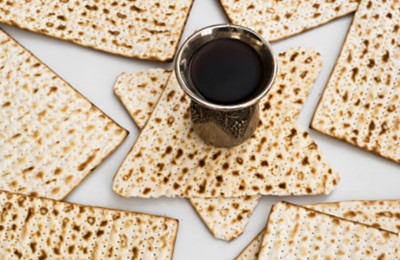
When Erev Pesach occurs on Shabbat, we burn the Hames on Friday morning (as opposed to ordinary years, when we burn the Hames on the morning of Erev Pesach). The Shulchan Aruch rules that in such a case, one must ensure to leave some bread for the Shabbat meals. As Hames does not become forbidden until several hours into the day on Shabbat morning, one is obligated to partake of bread as part of his Shabbat meals – as on a normal Shabbat – both on Friday night and Shabbat morning. At the same time, however, one must ensure not to save more Hames than he will need for his Shabbat meals, as this might create some difficulty in terms of ridding the home of Hames by the time the Hames prohibition takes effect on Shabbat morning. The meals eaten on this Shabbat should be completely Kosher for Pesach; the food should be prepared, served, and eaten with Pesach utensils. However, at the beginning of the meal, one should cover the table with a tablecloth, recite Hamotzi and eat bread to fulfill the obligation of the Shabbat meal. It is preferable to use Pita bread, which generally does not leave crumbs. After one eats the required amount of bread, he should carefully remove the tablecloth so that no crumbs fall to the floor, and then discard the tablecloth. It must be emphasized that although technically speaking the presence of small crumbs may not violate the Hames prohibition, one should nevertheless avoid leaving crumbs out of consideration to the wife, who exerted immense effort cleaning the home for Pesach. After removing the tablecloth used for eating bread, one should then set the table with Pesach utensils and eat the rest of the meal. This procedure should be followed on Shabbat morning, as well. In order to ensure to eat bread before the time Hames becomes forbidden, one should recite the morning prayers early Shabbat morning. It is therefore customary for services to be held in the synagogue very early on Shabbat Erev Pesach, either at sunrise or shortly thereafter. Upon completing the Shabbat morning meal, one should rinse his mouth to remove any residual Hames; according to some authorities, it is permissible to brush one's teeth on Shabbat, while other Rabbis forbid doing so. Any leftover Hames should be either flushed away or brought outside to the trash, at which point one should recite the "Kal Chamira" declaration as it is normally recited on Erev Pesach.
By Rabbi Eli Mansour
Erev Pesach on Shabbat – the First Two Shabbat Meals
Typography
- Smaller Small Medium Big Bigger
- Default Helvetica Segoe Georgia Times
- Reading Mode




